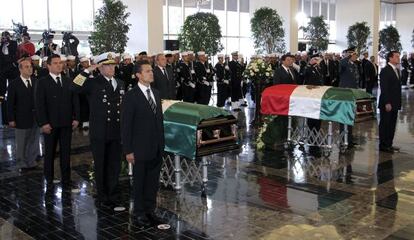Violent situation spins out of control in Mexico’s Michoacán state
Top navy admiral becomes most senior military officer to die in drug war


The surge in violence during a 24-hour period in the southwestern Mexican state of Michoacán has put the government of President Enrique Peña Nieto under pressure. The severity of the situation in the state, where cartels are battling each other for control of production and trafficking of drugs, was demonstrated on Sunday when Deputy Admiral Carlos Miguel Salazar was killed in an ambush, the secretary of the navy confirmed to EL PAÍS. He is the most senior military commander to die in the narcotics war to date.
Also on Monday morning, the body of the local public safety commander in the municipality of Lázaro Cárdenas was found next to a luxury Jeep Grand Cherokee with 10 gunshot wounds.
As they grapple with the difficult situation in Michoacán, the federal government has stopped its past practice of not officially informing the public about high-profile murders so as not to draw more attention to the problem.
On Monday, Attorney General Jesús Murillo Karam – who has given just two press conferences in his nine months in office: one to discuss the explosion at Petróleos Mexicanos headquarters and the other to announce the arrest of teachers union boss Elba Esther Gordillo – made a rare appearance before the cameras to blame the deputy admiral’s murder on the most powerful cartel in the state, Caballeros Templarios.
It was unclear whether the attack was related to his top position in the navy, but the incident is seen as a new chapter in the escalating drug violence that Michoacán is experiencing during this first year of the Peña Nieto government.
Murillo Karam said three people connected to the Caballeros Templarios, which has grown from a spinoff of the notorious Michoacana Family cartel, were arrested in connection with Salazar’s murder.
Michoacán is considered one of Mexico’s biggest production centers for marijuana, heroin and methamphetamine.
Prosecutors reported that the three admitted to receiving a 7,500-peso monthly salary within the cartel, which is about $600. The alleged hit men had four military-issued assault weapons and a pistol in their possession.
Salazar’s bodyguard was also killed in the attack, while his driver and wife were wounded. Salazar was on his way to his command post in Puerto Vallarta in neighboring Jalisco state when his vehicle was ambushed on a back road in Michoacán where he had spent a few days of rest, Murillo Karam explained. The deputy admiral had been traveling on a main highway, but had been forced to take another route where he was ambushed after his vehicle was stopped by men dressed in civilian clothes. Another vehicle approached with the gunmen firing. Prosecutors explained that the deputy admiral, who was also in civilian clothes, threw himself on his wife to protect her.
The murders of the deputy admiral and the local public security chief are the latest to take place in volatile Michoacán. Last Thursday four police officers were killed.
Michoacán is considered one of Mexico’s biggest production centers for marijuana, heroin and methamphetamine as well as an arrival point for narcotics and, especially, chemicals used to process drugs. The situation has grown worse in recent months when auto-defense groups began surfacing across the state to protect themselves from the cartels. These organizations claim that local police and government officials are collaborating with drug traffickers and law enforcement has been lax in many areas.
After the federal government sent in troops in May to deal with the loss of command by local authorities, it announced it would win back control within two months. But up until mid-July, 29 people across the state have died as a result of drug violence.
Tu suscripción se está usando en otro dispositivo
¿Quieres añadir otro usuario a tu suscripción?
Si continúas leyendo en este dispositivo, no se podrá leer en el otro.
FlechaTu suscripción se está usando en otro dispositivo y solo puedes acceder a EL PAÍS desde un dispositivo a la vez.
Si quieres compartir tu cuenta, cambia tu suscripción a la modalidad Premium, así podrás añadir otro usuario. Cada uno accederá con su propia cuenta de email, lo que os permitirá personalizar vuestra experiencia en EL PAÍS.
¿Tienes una suscripción de empresa? Accede aquí para contratar más cuentas.
En el caso de no saber quién está usando tu cuenta, te recomendamos cambiar tu contraseña aquí.
Si decides continuar compartiendo tu cuenta, este mensaje se mostrará en tu dispositivo y en el de la otra persona que está usando tu cuenta de forma indefinida, afectando a tu experiencia de lectura. Puedes consultar aquí los términos y condiciones de la suscripción digital.








































